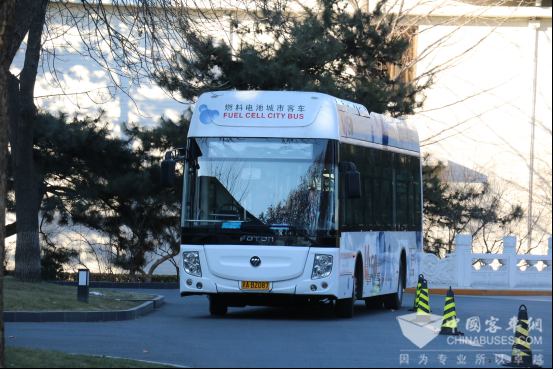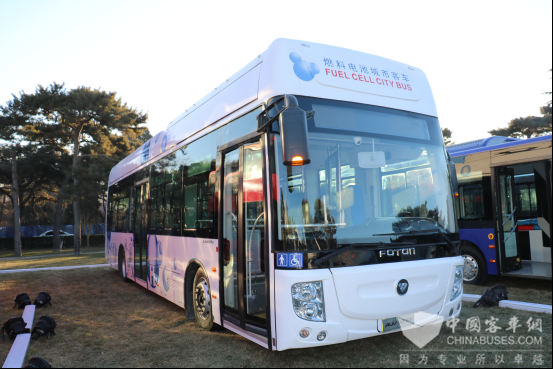Foton AUV Leads Hydrogen Fuel Cell Buses
2017-01-17
Foton AUV hydrogen fuel cell bus made a big splash during the two-day event Apart from one vehicle put on display, one big difference of this year’s China EV100 from was that three units 12-meter Foton AUV hydrogen fuel cell buses were designated to provide reception services for many distinguished guests, participants, and journalists from various media
On January 14 and 15, 2017 China Electric Vehicle 100 Forum, also known as 2017 China EV100 was held in Beijing. Themed with “Upgrade Core Technology, Innovation Leads the Future”, this year’s event aims to further promote exchanges and cooperation among different fields, industries and disciplines and push forward the fast and sound development of China’s electric vehicle (EV) industry.

Foton AUV hydrogen fuel cell bus made a big splash during the two-day event. Apart from one vehicle put on display, one big difference of this year’s China EV100 from was that three units 12-meter Foton AUV hydrogen fuel cell buses were designated to provide reception services for many distinguished guests, participants, and journalists from various media. Their smooth operation and powerful performances have once again won the universal praises from all participants. Featuring zero emission standards, low noise, smooth and stable operation, long continuous driving distance, and high fuel economy, Foton AUV fuel cell buses were the biggest highlights during the China EV100 Forum this year.
On the afternoon of January 15, at Fuel Cell Battery Technologies and Industrialization Forum, Qin Zhidong, Deputy General Manager of Foton AUV Bus Branch, delivered a speech on the commercialization and opportunities of fuel cell vehicles. Along with the worsening environmental pollutions, developing hydrogen fuel cell vehicles is of paramount importance. By 2030, China is aiming to cut its emissions of carbon dioxide by 60% to 65% compared with that in 2005. To achieve this ambitious goal, hydrogen power and fuel cell battery technologies are the most effective means.
Compared with lithium batteries, hydrogen fuel cells have a few advantages. First, they have an open reaction system and water is the only byproduct after the reaction; second, hydrogen fuel cell batteries are safer. Once the line of hydrogen is cut off, the vehicles will be safe; third, hydrogen fuel cells have higher energy density and lower power density.
As the industrial chain is forming and improving, hydrogen fuel cell vehicles promise a bright future. Currently, a total number of 28 units fuel cell buses are in smooth operation and three hydrogen gas refilling stations have been built. By 2019, the number of hydrogen fuel cell vehicles in operation is expected to hit 10,000 units and by 2020, the number will rise to 13,000 units.
“As a socially responsible enterprise, we (Foton) are fully committed to developing the most advanced hydrogen fuel cell vehicles for the world”, says Mr. Qin. Instead of using storage batteries, Foton AUV hydrogen fuel cell bus is equipped with a newly developed device which makes the electrochemical reaction between oxygen and hydrogen without causing combustion and mechanical wear. After the reaction, only electricity, heat and water are produced. With a refill of hydrogen for ten minutes, the 12-meter Foton AUV hydrogen fuel cell bus is able to drive 500 kilometers continuously.
Another noticeable advance made by Foton AUV is its globally competitive dry film technology, which help its fuel cell bus work smoothly in minus 20 degree Celsius. Moreover, it can withstand such extreme low temperatures as minus 46 degree Celsius. Plus Foton intelligent management system, the fuel cell bus fully ensures the safety of passengers, drivers and the vehicle itself.
After an overall review of Foton AUV fuel cell bus, a foreign bus experts said, “Foton vehicle is superbly good and the bus maker has certainly won the crown jewels of the global new energy bus industry.”

